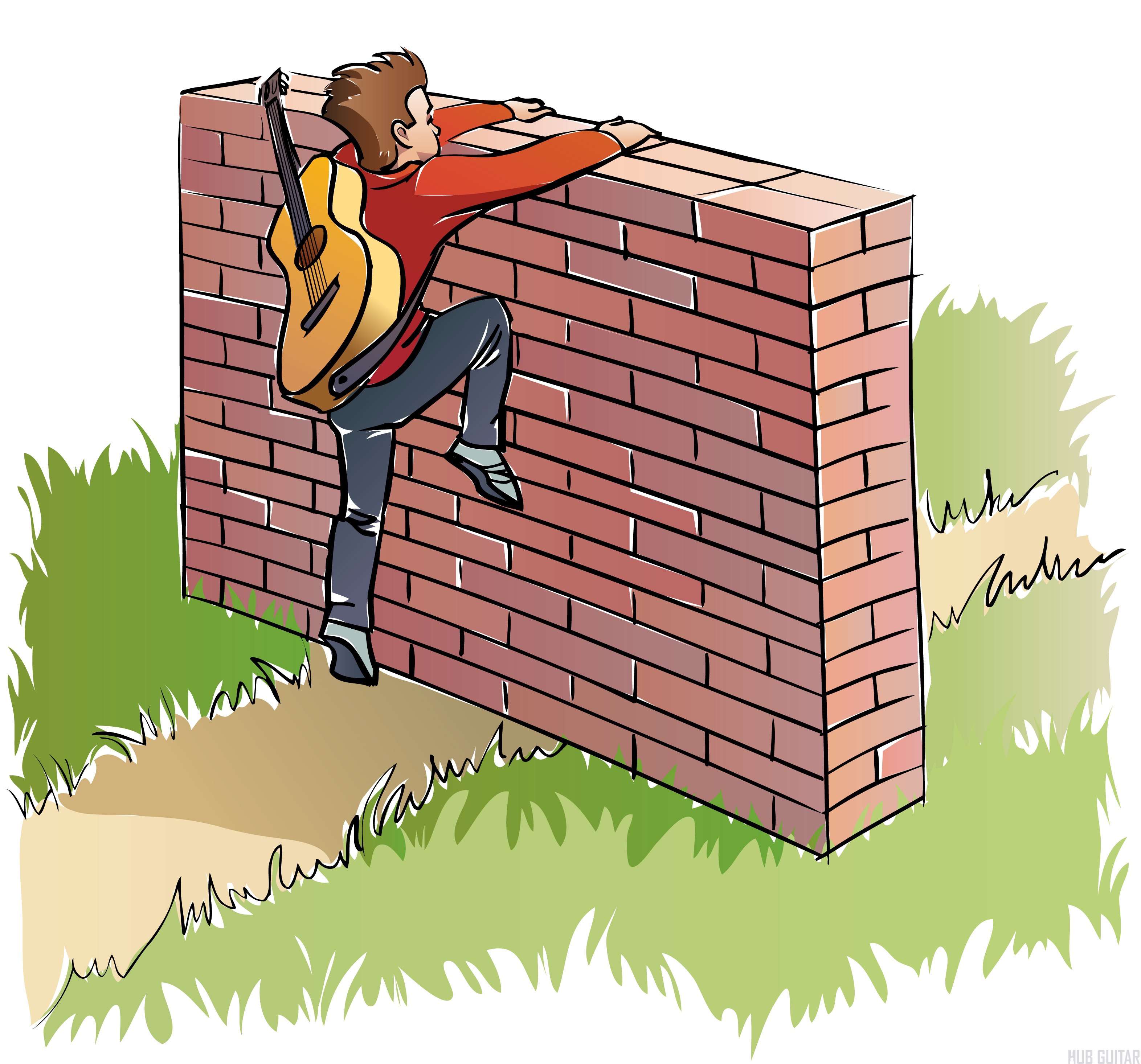Practice-Resistant Problems

Artwork by Sergey Banityuk
During the study of guitar, you will encounter many points needing improvement. These can be as small as the improvement you wish to make when leaping from a low “A” on the Vth fret of the 6th string to a high “B” on the VIIth fret of the 1st string. (For example: You'd like to be accurate 100% of the time instead of 95%). It can also be a more general problem you wish to improve on, such as a difficulty in stretching your pinky to reach notes outside of the position, or struggling with position shifts. The list is endless.
Each area of your guitar practice will respond differently to different types of practice treatments.
Identify a single area of your practice you wish to improve upon, and apply the following thought exercise to it.
Practice Treatments
Here’s a short list of practice treatments that can be used to solve problems and make improvements:
- Rote repetition. Repeat and repeat (the old favorite!)
- Practice at an insanely slow tempo.
- Practice with a metronome (slowly getting faster; helps with speed)
- Record the example and listen back (helps you find hard-to-spot improvements such as to your tone).
- Practice consistently, daily (helps sharpen skills that get rusty fast, ex: memory, many techniques)
- Rethink the problem entirely (maybe a piece is unlearnable because you chose bad fingerings)
- Condition your hands and fingers to be stronger, more flexible, or more independent
Common Examples of Practice Resistance
Playing every day but not memorizing
You might be surprised to find that you still haven’t memorized a piece despite having played it many, many times. This is because to memorize a piece, you must play it without looking at the music. The longest path to memorizing a piece is simply reading it over and over again from the paper.
Playing fast (but not slow)
If you find yourself playing something faster and faster, but not better and better, this one might be affecting you.
In addition to challenging yourself to speed up the metronome, you’ll also want to challenge yourself to slow the thing way down and nitpick at the minor details that are making your technique sloppy, or your tone bad.
Sliding back down the pole
Sometimes practice resistance results from "sliding down the pole" again, after having worked so hard to climb up.
This is especially true of areas of guitar playing that seem to quickly get “rusty” after even a short period of disuse.
One great example is a special technique that you seldom use, such as fast tremolo picking. Just when you’ve got it fast, clean and consistent, it starts slipping away again, unless you use it every day. Those muscles tend to be unforgiving after a week of disuse.
Not being able to hear improvements
If you can’t hear improvements, you can’t really be expected to make improvements.
It’s important to take measurements with accurate tools. If the scale at the post office had a margin of error of 16 ounces, it would not be a useful tool for weighing parcels with.
And as your playing advances, your eyes and ears will start to lag behind, too. In order to get a more accurate reading on what you’re doing, you may need to start recording yourself. Or maybe you need to take a lesson with an expert who can give you clear feedback.
Working on your ear training skills will sharpen your senses and improve the feedback loop that pushes you to make improvements.
On Day 1 of playing guitar, you could probably tell right away if you were playing a real note or some awful noise.
Several months in, you could probably differentiate between a right note and a wrong note.
But, years down the line, how do you differentiate between a note whose tone is 99.5% accurate and 99.8% accurate?
You might have to listen several times to really hear the difference.
To keep making improvements, you’ve got to keep raising the bar. And you might not be able to rely on listening to your own playing with your own ears anymore. You might need to record yourself, or take a lesson with someone more advanced than you.
Not making technique improvements
If you’re not seeing improvements to your technique anymore, you may be dealing with a practice-resistant problem.
One way that this manifests is through tension. If you’re practicing beyond your difficulty level, you might notice the tension increasing in your hands. A little bit is good for a workout. But push forward too far and you’ll notice that the tension builds up. This excess in tension is antithetical to developing better technique, because great technique is totally relaxed. Think about a physical movement you’ve mastered. It feels very relaxed from start to finish.
Another thing to consider is whether the practice time and frequency and challenge level are sufficient. To improve a technique, you need to invest some time practicing it, ideally every day, and at the ideal difficulty level.
Using the Wrong Practice Treatment
From the list above, some practice treatments are better than others. And some types of practice are better for certain types of outcomes. For instance, reading a piece over and over again is not a very good way to memorize it. You'd need to actually put away the sheet music for that.
Practicing How To Do It Wrong
In some cases, you might actually be practicing how to do something wrong, which means that every time you practice it, you get worse at it. This is especially true for techniques. Little is worse than getting very “good” at a flawed technique you never should have used to begin with. Then you have to start over again from the beginning, knowing that you actually play it better the “wrong way” than the “right way”. This one can take months to sort out.
But the good news is there is no time like the present.
And fortunately most “flawed” techniques can still improve your awareness and skill level as a guitar player. But when a technique is no longer serving you, it’s time to seek out another.
Mastering the guitar is mastering yourself. If you could become a master of guitar practice, you could quickly eliminate problems that have nagged you for years. One by one they would disappear, and you would continually improve as a player.
Coda
It pays to monitor where you’re getting results from practice and where you’re just spinning your wheels. By identifying practice-resistant problems, you can take the first step towards resolving them.
 As the creator of Hub Guitar, Grey has compiled hundreds of guitar lessons, written several books, and filmed hundreds of video lessons. He teaches private lessons in his Boston studio, as well as via video chat through TakeLessons.
As the creator of Hub Guitar, Grey has compiled hundreds of guitar lessons, written several books, and filmed hundreds of video lessons. He teaches private lessons in his Boston studio, as well as via video chat through TakeLessons.